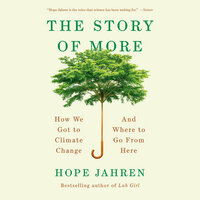Take a photo of a barcode or cover
467 reviews for:
The Story of More: How We Got to Climate Change and Where to Go from Here
Hope Jahren
467 reviews for:
The Story of More: How We Got to Climate Change and Where to Go from Here
Hope Jahren
It's an OK green read...but honestly, not very convincing to a level where it makes me make a big change (although I want to - else I would not bother reading it).
I am all pro climate preservation, not messing with nature in any way we can, substantial living, etc.... yet I also look for a balance. The author seems to strive to achieve that and...gets lost in trying to present it in an even way.
Among the fun facts about Hope Jahren's life and trivia as how salmon is bred in farms in Norway, the reader manages to go through, and till the last page, it is interesting to listen (I used the Audible version). Still, at the end, when you look back at what you have read - it is the same old. Namely (pick one, as the author says!):
- eat less meat;
- save energy;
- go for organic growth (admiration for a place in the book where the author highlights how GMO is not that bad at all);
- spend less on unnecessary stuff;
- eliminate unnecessary waste;
- rehabilitate nature (although the author balances and explains why this is a nice hobby, yet not very resourceful);
etc. etc.
So, if you have 5-6h for a past-time read - by all means, go ahead and listen/read the book. Else, take the lesson from the end and it is - pick one direction and practice, practice, practice. Get diligent and then see results eventually when others do the same.
I am all pro climate preservation, not messing with nature in any way we can, substantial living, etc.... yet I also look for a balance. The author seems to strive to achieve that and...gets lost in trying to present it in an even way.
Among the fun facts about Hope Jahren's life and trivia as how salmon is bred in farms in Norway, the reader manages to go through, and till the last page, it is interesting to listen (I used the Audible version). Still, at the end, when you look back at what you have read - it is the same old. Namely (pick one, as the author says!):
- eat less meat;
- save energy;
- go for organic growth (admiration for a place in the book where the author highlights how GMO is not that bad at all);
- spend less on unnecessary stuff;
- eliminate unnecessary waste;
- rehabilitate nature (although the author balances and explains why this is a nice hobby, yet not very resourceful);
etc. etc.
So, if you have 5-6h for a past-time read - by all means, go ahead and listen/read the book. Else, take the lesson from the end and it is - pick one direction and practice, practice, practice. Get diligent and then see results eventually when others do the same.
not my usual read but enjoyed this - it wasn't full of doom and gloom and ended on a really hopeful note. made me think about how far we've come and how far we have to go!
I listened to the audio book, read by the author Hope Jahren, and I’m glad I did! I loved Lab Girl and the Story of More did not disappoint. Her meticulous research and presentation of climate and consumption data is the most thorough and most personal account I’ve ever read. I liked that she outlined the problem with us as the central character in the story. It’s our choices: food, transportation, and energy that have led to climate change and are leading to a 6th mass extinction. It is however a hopeful book, and she talks about how playing into fear is part of the problem, offering instead a clear plan to writing the story of less. I appreciated her attention to inequity and injustice, both in the book and in the Appendices in more detail. The climate crisis impacts different people differently. In the U.S., that means women and people of color. Globally, the means the OECD is hugely causing and accelerating the crisis while the underdeveloped countries suffer most as a result. I think her points about industry and incentives are important—companies aren’t going to change on their own. The story of less won’t generate new wealth. It’s up to us. She says, ‘We will never change our institutions if we cannot change ourselves.’
Personally, our family does consume less: from being 100% vegan myself and living with two others who roughly eat plant-based food 90% of the time. We also use less than half of the average kWh of electricity than an American family per year and that electricity is 99% hydropower. We fly very little (this year aside of course) and we take public transit to work, only driving on the weekends, ad hoc errands, and vacations. But, ‘An effort tempered by humility will go much farther than one armored with righteousness,’ says Jahren. I want to look at our investments—do our retirement funds and college savings fund invest in fossil fuels, sugar production and consumption, or industrial agriculture? I want to look at our plastic usage and clothing as well. We are lucky enough to have more than enough, we can use our power to reverse this crisis.
Personally, our family does consume less: from being 100% vegan myself and living with two others who roughly eat plant-based food 90% of the time. We also use less than half of the average kWh of electricity than an American family per year and that electricity is 99% hydropower. We fly very little (this year aside of course) and we take public transit to work, only driving on the weekends, ad hoc errands, and vacations. But, ‘An effort tempered by humility will go much farther than one armored with righteousness,’ says Jahren. I want to look at our investments—do our retirement funds and college savings fund invest in fossil fuels, sugar production and consumption, or industrial agriculture? I want to look at our plastic usage and clothing as well. We are lucky enough to have more than enough, we can use our power to reverse this crisis.
Extremely concise, well-researched, and thoughtful read on humanity’s consumption of food, fuel, and resources—and how they has impacted climate change. If you’re looking for ways to take steps to fight climate change, it also offers resources.
(It took me so long to read because I was working and away from books.)
(It took me so long to read because I was working and away from books.)
medium-paced
An interesting but basic look into consumption and climate change.
This book is a great jumping off point for someone looking to refresh their knowledge or start learning about climate change and consumption.
But, if you already keep up to date with these issues and consider yourselves fairly well read around the topic, this maybe isn't for you.
This book is a great jumping off point for someone looking to refresh their knowledge or start learning about climate change and consumption.
But, if you already keep up to date with these issues and consider yourselves fairly well read around the topic, this maybe isn't for you.
This book started out really well, with lots of interesting facts and anecdotes surrounding topics I am personally not very well versed in when it comes to climate change and consumption.
However, it started to become very apparent to me how basic and surface level the information being presented was, particularly when it started to explore topics I am well versed in. In turn, this made me doubt how in-depth a lot of the early chapters were.
While I understand that it would be impossible to back up every single point made, there were moments were the lack of evidence and context surrounding a claim or fact was puzzling. Especially, when I know why those points are being mentioned and just how important it is to know the context. Otherwise these important facts or well thought-out claims for their context is lost, and ultimately this may end up doing more harm than good.
I also felt it lacked the encouragement I'd like to see from someone so well informed about climate change, regarding pressing on political bodies and businesses to do their bit. Instead of a "yeah, they said they would but they didn't, and they probably never will". It felt a little like instead we are being told its all down to the individual to make the change, which while as individuals we should, we also need to be bringing the heat to those in power.
Overall, I did enjoy this book. The anecdotes about the authors life and how much everything has changed since they were a kid really brought everything in The Story of More into context, in a broad sense. And I did learn quite a few things from this book that had me researching more afterwards.
However, it started to become very apparent to me how basic and surface level the information being presented was, particularly when it started to explore topics I am well versed in. In turn, this made me doubt how in-depth a lot of the early chapters were.
While I understand that it would be impossible to back up every single point made, there were moments were the lack of evidence and context surrounding a claim or fact was puzzling. Especially, when I know why those points are being mentioned and just how important it is to know the context. Otherwise these important facts or well thought-out claims for their context is lost, and ultimately this may end up doing more harm than good.
I also felt it lacked the encouragement I'd like to see from someone so well informed about climate change, regarding pressing on political bodies and businesses to do their bit. Instead of a "yeah, they said they would but they didn't, and they probably never will". It felt a little like instead we are being told its all down to the individual to make the change, which while as individuals we should, we also need to be bringing the heat to those in power.
Overall, I did enjoy this book. The anecdotes about the authors life and how much everything has changed since they were a kid really brought everything in The Story of More into context, in a broad sense. And I did learn quite a few things from this book that had me researching more afterwards.
informative
inspiring
reflective
Thoroughly enjoyed the way Jahren weaves the different aspects of this book into a perfect package! Refreshing honesty about climate change served in a digestible voice with steps to move forward.
dark
informative
sad
medium-paced
Really hoped that there would be more of the "... and Where To Go From Here" in this book. It mostly was an interesting and depressing description of "How We Got To Climate Change", and while I enjoyed learning a bunch of new information about that, I found the book largely a downer. The fact that most of the "what to do about it" was in the appendix, and boiled down to "wash your clothes with cold water" and "see how you can stop using your car" was disappointing. The writing style was super engaging though, and I really enjoyed the author's narration in the audiobook.
informative
sad
medium-paced
This is a concise, straightforward detailing of what has changed in our world to propel us towards irreversible climate change in the last few decades. There's really no arguing with the facts here, but the conclusion of "what can you do as one person to reduce your impact" is just not it. Widespread national change needs to be enacted to even make a dent, and no matter how many vegetarians pop up it just won't be enough. The tone here is somber, and with good reason.







